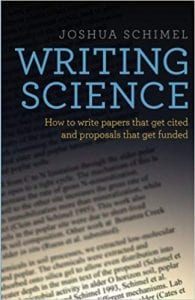(by Dr Emma L Turner, Senior Research Associate, Bristol Medical School – PHS)
I started reading this book as someone who dislikes the writing process, and to be honest I can be quite avoidant when undertaking writing. It was therefore with some trepidation that I volunteered to do this review. I fully committed, and decided I would carry out the practical exercises along the way in the hope of kick starting new habits and embracing this part of my academic career.
Joshua Schimel has a very clear conversational style of writing, and I found the book a pleasure to read. It did however take me longer to read then I anticipated as I kept stopping to note down ideas and thoughts. The change in perception I mention in the title of this review comes from the statement that “As a scientist you are a professional writer” – this concept is introduced in the first chapter of the book and certainly did give me pause. Schimel also advocates that we study and develop writing as thoroughly as we develop our other research tools. I decided it was time to stop my avoidant behaviour, I needed to develop and practice my writing.
The exercises spread throughout the book ask you to analyse published papers to consolidate the principles being described. He also encourages getting together a writing group to allow you to review each other’s writing, as the second part of the exercises require you to write short articles. I didn’t form a writing group but can see the benefits.
Throughout, the book focuses on the structure of writing: opening framing an interesting question; challenge presenting the research and results; action the discussion of what it means; and resolution the take home message. Schimel wants us to embrace the story telling in scientific writing. The best stories stick, and become papers that get cited or proposals that get funded. We could even think of data as supporting actors in the story, with questions and the larger issues being addressed as the lead actors.
I suppose the highest praise I can give this book would be that I have decided to buy my own copy so I can refer to it again and again. The final message from Schimel is to “learn to embrace the pain and enjoy the process” – I can’t say I am there yet, but it is still early days….and I do believe I am now on the road to becoming a scientist-writer.


